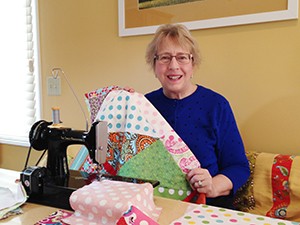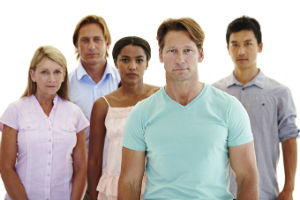
Because she’d worked in health care for more than 30 years, she was aware of the risk factors for colorectal cancer—and knew that some of them applied to her.
For example, she was over the age of 50, she’d had a polyp removed after her first colonoscopy 10 years earlier and she was diabetic.
Yet Charlesworth didn’t consider herself at high risk for colon cancer because her lifestyle was healthy. Plus, she experienced no colorectal cancer symptoms.
So it came as a shock when a colonoscopy at age 60 detected what proved to be a cancerous tumor in her colon. This was in May 2014. Two weeks later she had surgery to remove the right side of her colon. Six months of chemotherapy at the Spectrum Health Lemmen-Holton Cancer Pavilion followed, ending just before Christmas.
With that chapter of life behind her, Charlesworth is setting new goals for the future.
“I feel like I dodged a bullet,” she said.
Colorectal cancer risk factors
The unfortunate truth about colorectal cancer is that even healthy adults are at risk, said Charlesworth’s surgeon, Nadav Dujovny, MD, a specialist in colon and rectal surgery with Spectrum Health Medical Group.
“Everyone is at risk,” Dr. Dujovny said. “Some are more than others, but everyone is at risk because the biggest factor is aging.”
In addition to older age, factors that put people at an increased risk for colorectal cancer include:
Lifestyle
- Cigarette smoking
- Heavy use of alcohol
- Diet high in red meat or processed meat
- Physical inactivity
Medical
- Personal history of colorectal polyps or any type of cancer
- Inflammatory bowel disease, including Crohn’s disease and ulcerative colitis
- Diabetes
- Obesity
- Previous radiation therapy directed at the abdomen
Hereditary
- Family history of colorectal cancer, especially in a parent or sibling (if this describes you, Dr. Dujovny recommends starting colonoscopies at age 40)*
- Lynch syndrome, familial polyposis and similar inherited diseases
- African-American or Ashkenazi Jewish heritage
*Consider talking with a genetic counselor at Spectrum Health’s Inherited Colorectal Cancer Program if you have multiple close family members with colorectal or other cancers, especially if one of them was diagnosed at a young age.
Screening is essential
Like Charlesworth, most people with colorectal cancer—more than 90 percent—are diagnosed after age 50. National guidelines therefore recommend that everyone be screened for colorectal cancer starting at 50—or at 45 for African-Americans.
Although there are several screening methods in use, Dr. Dujovny recommends a colonoscopy because it does the best job of preventing cancer and not just detecting it.
“With a colonoscopy, if we find a polyp and remove it, it will never grow up to be a cancer,” Dr. Dujovny said. “A colonoscopy gives you the best bang for your buck.”
After cancer, a new start
If she could go back in time, Charlesworth would do more to decrease her colorectal cancer risk.
“I wish I had been more focused on my diet and on exercise earlier on,” she said. She also wishes she had pushed for cancer screening after five years instead of after 10.
In fact, research confirms that colon cancer patients have a better chance of survival if they’ve already been practicing healthy lifestyle habits before their diagnosis. Strongest factors included eating more fruits and veggies and maintaining a normal weight before diagnosis.
But rather than focus on the past, Charlesworth is looking ahead. Having chosen to retire rather than return to work after cancer, she has less stress and more time for new projects.
She plans to join a nationwide clinical study to test drugs that may prevent the recurrence of colorectal cancer, and she is pouring herself into the things she loves.
“What I’m passionate about is my quilting,” Charlesworth said.
While undergoing chemo, she began reconditioning vintage sewing machines, which she now uses to make quilts. Inspired by the families she met when her grandson, Danny, was undergoing a bone marrow transplant, Charlesworth plans to sew quilts for parents of children being treated for cancer.
“This is something I’ve been thinking about doing ever since Danny was born, and now I have time,” she said. “I hope I have a lot of time.”
 /a>
/a>
 /a>
/a>
 /a>
/a>